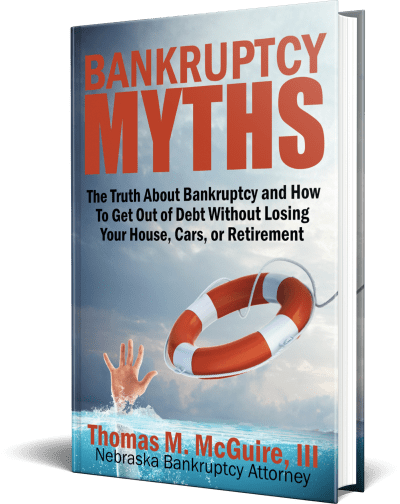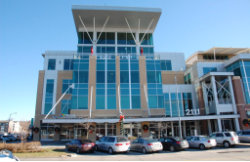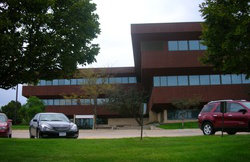Chapter 7 Bankruptcy
Experienced Chapter 7 Bankruptcy Attorneys in Lincoln, Grand Island and Omaha Nebraska
If you’re tired of living paycheck to paycheck and never being able to pay off your credit cards and other debts, Chapter 7 bankruptcy might be the answer for you. This type of bankruptcy can give you a much-needed fresh start and might eliminate many of the debts that are overwhelming you.
Here is what to know about Chapter 7 bankruptcy and how we can help.
What Is Chapter 7 Bankruptcy?
Chapter 7 bankruptcy is often referred to as “liquidation” or “straight” bankruptcy because the debtor liquidates their non-exempt assets to pay off some of their debts. Any remaining eligible debts are discharged, and you are no longer required to pay them off.
Chapter 7 bankruptcy is the most common type of bankruptcy filing in the United States. Unlike Chapter 13 bankruptcy, debtors don’t have to enter into long repayment plans. Instead, they can often walk away from debt that is causing financial distress. Additionally, thanks to exemptions, debtors can keep most of their personal property.
Get A Free Bankruptcy Evaluation Today
Call (402) 965-0775 or (308) 221-8222 or click here to submit a consultation request form now.
Get Help Now
Qualifying for Chapter 7 Bankruptcy
Because Chapter 7 bankruptcy allows for the complete elimination of many debts (rather than repayment), there are strict guidelines that you must meet to qualify for its protections. The simplest way to qualify for Chapter 7 bankruptcy is to show that your income is less than the median income for a household the same size as yours in Nebraska. Click here to get the updated household size and income limits from the U.s. Trustee.
If you earn more than the amount listed for your household size, you might still pass the means test and qualify for Chapter 7 bankruptcy if your monthly disposable income is low enough after accounting for certain expenses.
Under the full means test, you subtract your reasonable and monthly expenses from your monthly income to determine the disposable income you have left. Some reasonable and necessary expenses include:
- Mortgage or rent
- Transportation expenses
- Food
- Utilities
- Court-ordered payments
- Childcare
- Involuntary paycheck deductions
- Out-of-pocket healthcare costs
For some of these expenses, you use the actual amount you pay each month. For others, you must use a standard allowance (which may be more or less than you pay) that is determined by the IRS.
This process is complicated and there are many special rules that apply, so it’s best to work with an experienced Nebraska bankruptcy lawyer to ensure you accurately perform the calculations.
Learn The Truth About Bankruptcy And How To Get Out of Debt Without Losing Your House, Cars, or Retirement

Bankruptcy Attorney Thomas M. McGuire reveals five bankruptcy myths that keep people drowning in debt and afraid to claim the fresh start they deserve.
Learn The Truth About Bankruptcy And How To Get Out of Debt Without Losing Your House, Cars, or Retirement

Bankruptcy Attorney Thomas M. McGuire reveals five bankruptcy myths that keep people drowning in debt and afraid to claim the fresh start they deserve.
Benefits of Chapter 7 Bankruptcy
Chapter 7 bankruptcy can provide important benefits to debtors, including:
- Issuance of an automatic stay – Once you file Chapter 7 bankruptcy, the court orders an “automatic stay.” This is a special order from the court that tells your creditors that they cannot take or continue any further collection or legal action against you while the case is pending. This stops collection letters and phone calls from creditors. For many debtors, the automatic stay can also help prevent foreclosure, repossession, and wage garnishment. In some cases, it might also prevent a lawsuit from being filed against you.
- Relief from debt – Unlike other forms of bankruptcy, Chapter 7 bankruptcy may completely eliminate some of your debt. You won’t be legally required to pay back creditors for your discharged debt. This can give you a fresh start financially.
- Speed – Chapter 7 bankruptcy can often provide much-needed financial relief within only a few months. You’re not locked into a years-long repayment plan.
Debts that Can Be Discharged Through Chapter 7 Bankruptcy
Many debts can be discharged through a Chapter 7 bankruptcy, including:
- Credit card debt
- Medical bills
- Personal loans
- Repossessions
- Wage garnishments
You can also discharge car loans and mortgages for property that you do not want to keep. If you want to keep your home, car, or other secured debt, you can reaffirm the debt. This says that you want to keep the property and you agree to continue paying off the associated debt.
There are a few types of debts that are not dischargeable, such as child support, alimony obligations, and certain back taxes.
What Is Involved in Chapter 7 Bankruptcy?
These steps are involved in obtaining Chapter 7 bankruptcy relief:
- Attend a credit counseling – You must take a credit counseling course within 180 days of filing your bankruptcy petition. The credit counseling course can be done by phone or internet.
- Prepare the petition – A knowledgeable bankruptcy lawyer can help prepare your petition for bankruptcy. This involves accurately listing your assets, income, and debts.
- Bankruptcy trustee is appointed – A bankruptcy trustee is appointed to administer your bankruptcy case and liquidate any non-exempt assets. If all of your assets are exempt or subject to liens, the trustee files a “no asset” report with the court and makes no distribution to unsecured creditors.
- Attend the meeting of creditors – The bankruptcy trustee conducts this meeting. They ask you to verify your identity and ask questions about your bankruptcy petition and financial situation. Creditors can also appear and ask questions.
- Complete a debtor’s education couse – The debtor’s education course can be done by phone and email.
- Court orders discharge – If everything goes as planned, the court will issue a discharge that releases you from personal liability for the debts that were included in the bankruptcy. Your creditors cannot take any further collection action against you for the discharged debts.
Get A Free Bankruptcy Evaluation Today
Call (402) 965-0775 or (308) 221-8222 or click here to submit a consultation request form now.
Get Help Now
Chapter 7 Bankruptcy FAQs
Chapter 7 bankruptcy is the most common type of bankruptcy filing in the United States. It discharges most types of debts so that you are no longer legally responsible for paying them. Unlike Chapter 13 bankruptcy, you do not need to make ongoing payments to your creditors pursuant to a reorganization plan.
No, you are not legally required to have a lawyer. However, when you prepare your bankruptcy petition and related forms, you are swearing to their accuracy. If you make misstatements or mistakes, the consequences can be severe, potentially even involving criminal implications. A lawyer can ensure that you prepare your bankruptcy forms correctly and accurately. A lawyer can also advise you of your legal rights and options and help determine the best path forward to resolving your financial issues.
Chapter 7 bankruptcy can potentially eliminate your debt. It is a relatively fast process, allowing you to get a financial fresh start quickly.
A Chapter 7 bankruptcy will remain on your credit report for ten years. You may have to surrender some of your non-exempt property, but your lawyer will work to minimize this.
To file for Chapter 7 bankruptcy, you must pass the means test.
Click here to get the updated household size and income limits from the U.s. Trustee.
Even if your income is above the median income for the household the same size as yours, you may still pass the means test if you can show that you do not have enough disposable income to pay your debt.
There is no minimum amount of debt you must have before filing for Chapter 7 bankruptcy. Once you find that you are unable to meet your debt obligations, you might want to consider bankruptcy.
While every case is different, most cases can be wrapped up from start to finish in three to six months.
Most people who file Chapter 7 bankruptcy do so because they have a lot of unsecured debt, which is debt that is not secured with collateral like a house or a car. Most forms of unsecured debt can be discharged through Chapter 7, including:
- Credit card bills
- Medical debt
- Personal loans
- Leases
- Lawsuit judgments
- Repossessions
- Check Cashing
Chapter 7 bankruptcy can also relieve you of secured debt, such as a home mortgage or auto loan, but you will have to surrender the collateral.
Chapter 7 bankruptcy does not discharge (or remove) all debts. Debts that are excluded include things like child support, alimony payments, fines, penalties, certain tax debts, fees for HOAs or condos, retirement account loans, or debts you could not discharge in an earlier bankruptcy.
Not all debts can be discharged through Chapter 7 bankruptcy, such as:
- Child support or alimony payments
- Criminal fines or penalties
- Certain tax debts
- Fees for HOAs or condos
How an Experienced Nebraska Bankruptcy Attorney Can Help
Bankruptcy is a complex legal process. If you make a mistake, the consequences can be severe, such as not being able to discharge a debt or even having your case dismissed. At McGuire Law Offices, we can provide a transparent assessment of your case and explain your legal options based on your specific circumstances. Our Nebraska bankruptcy lawyers can:
- Determine if you pass the means test – We can evaluate your income and expenses and determine if you pass the means test to qualify for Chapter 7 bankruptcy relief.
- Account for all your debts – You will want to ensure that all of your eligible debts are included in your bankruptcy filing. We can also evaluate whether Chapter 7 bankruptcy is the best fit for you, based on the types of debts you have.
- Apply exemptions – We can use our extensive knowledge of Nebraska exemptions to ensure that you keep as much of your property as possible.
- Reaffirm certain debts – If you want to keep certain assets, such as your home or car, you might need to “reaffirm” the debt so that the asset is not made part of your bankruptcy case. Our lawyers can review your existing agreements and help you decide what to keep in place after the discharge.
Contact a Nebraska Bankruptcy Lawyer to Find Out if You Qualify
The decision to file for Chapter 7 bankruptcy in Nebraska is not a light one. However, if you are struggling financially, the experienced bankruptcy lawyers at McGuire Law Offices can review your situation and advise you of your legal options. We have the skills and experience to guide you through the complex bankruptcy process and help you emerge on more solid financial footing.
Contact McGuire Law Offices for a free consultation to determine if Chapter 7 is right for you. We serve clients throughout the state of Nebraska from our offices in Lincoln, Omaha, and Grand Island.

Free Consultation


